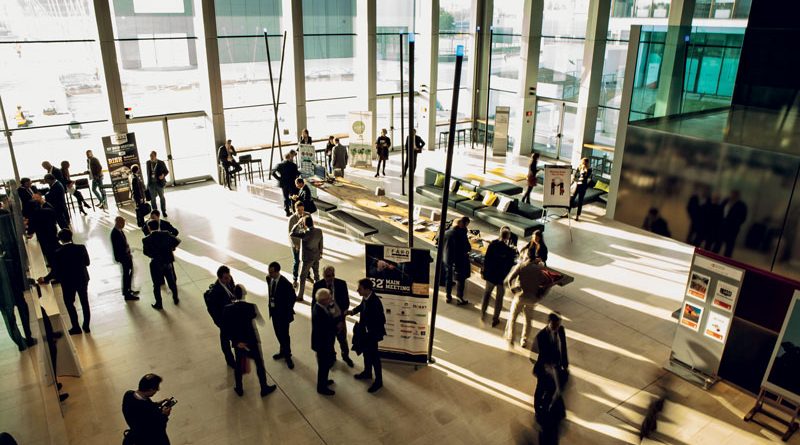F.A.R.O. 52 at Bergamo’s Kilometro Rosso
The evolution of the global context, what is happening on the markets, the reasons and the correct interpretation keys needed not to be caught unprepared
by Mario Conserva
The 52nd Meeting of the F.A.R.O. Club at Kilometro Rosso in Bergamo, held on October 25th with a very successful turnout, interpreted, in its renewed format, many questions and unknowns of the international political, economic and financial scenarios, with signs of chaos in the markets and significant elements of fragility in the differentiation between the various areas.
Concerns are legitimate, as Paolo Kauffmann said, opening the works, because in spite of the momentum which the global economy managed to keep up for the entire year, the impression may be felt that the danger of collapse is imminent, and this holds valid especially in our country where it is very fashionable to express thoughts freely and unreservedly, and anyone in the political or economic fields may do so.
After the introduction to the works by F.A.R.O.’s founder, Arrigo Sadun, President of TLSG International Advisors, presented the customary strategic vision on international markets, starting from an analysis of the United States, the only truly driving economy in the world today. According to Sadun, it is undeniable that, apart from the character’s extravagance, Trump introduced in the global political scenario a new approach to many issues, with an unusual roughness and no respect of the rules, but with the unquestionable success of a 4% growth rate, succeeding in doubling the result of his predecessor Barack Obama after choosing growth-oriented economic policies and having relied on two essential tools, fiscal reform and administrative action, to pull out the system’s bureaucratic stoppers. And he also hit bull’s eye in defining the match against China, the real great competitor for global leadership in the next decades, launching the challenge at the right time, in a phase when Beijing is dealing with a deceleration of its growth rate (down to 6.5%) and local institutions must get ready to face a transition which will largely determine the country’s future. According to the President of TLSG International Advisors, we are still at an early phase of the tug-of-war between the two powers which goes well beyond the tariff war, the strife is destined to last years and it could become harsher. The solidity of the Trump administration is definitely linked to the outcome of the mod-term elections, where a democratic upsurge is foreseen and expected but difficult to quantify in its magnitude. It could be the prelude to a stalled situation, affecting the fiscal benefit and economic stimulus campaigns which so far characterized the Trump era, but it should not be forgotten that he popular consensus of the US President is still very strong among his electors because Trump managed to identify and satisfy their demands trying to redistribute more fairly the benefits of globalization. The truth is that even after a solid victory by democrats, overwhelming consequences in the economic domain are not likely; their aim is to exert a tighter control on President Trump’s work and not to contribute to a collapse of the markets; there is no doubt that a rapid stabilization is in everyone’s interest.
The European situation and the Italian uncertainty
Looking at Europe, here crisis situations are not lacking, many worries still derive from the pathway towards Brexit which according to Sadun is only starting now to show its most negative consequences; there are problems with Germany too, the decrease in Angela Merkel’s political credibility reflects errors in strategic choices and has the effect of slowing down German economy and industry which are currently sluggish, with a weaker Germany everything is more difficult in Europe. Finally, Italy, where negative notes are serious: Arrigo Sadun, ending his speech which balanced realism and provocations, warned about the risk for our country of falling into an Argentinian type of scenario, with practically no reaction on the part of industrial players. This is the real focal point of the heavy uncertainties which are unsettling our present political phase, a dangerous process outlined by amateurs and characterized by a frantic race with supermarket claims and huge fakes taken in stride by partisan electors, such as, the idea that Vladimir Putin’s Russia could purchase our country’s long-term treasury bonds.
This theme created a connection with the following speaker Giorgio Arfaras, who immediately specified that Italy’s real problem is not so much the possible overrun of the deficit ceilings imposed by Europe, since a deviation could be justified, if functional to a structured plan to relaunch the economy; the real difficulty lies with the act that Italy’s financial coverage is too scarce to allow it to encompass, on one hand, citizenship income and, on the other hand, the wishes of markets and enterprises. This is where contradictions stem from, since part of the government built its success on social consensus and on welfare, irrespective of the cost which these might have, while the other part during the past decades established strong and interested connections with entrepreneurs oriented by the concepts of merit and by the economic rule of demand and supply, and it is hard for these two worlds to discuss and understand each other.
Operative tables on risk management
During the afternoon, the new format began, consisting in operative tables to spark off the debate on risk management solutions. A pool of experts, subdivided by topic, presented the current situation and created an interactive debate with participants. Various topics were therefore considered, from the coverage of community risks, with the participation of Ed Meir, multiple award-winning analyst known for the accuracy of his forecasts regarding non-ferrous metals, and of the F.A.R.O. Board, with its forecasts for 2019, going on to currencies and rates, energy and hot new topics, such as, Smart contracts and the Blockchain, and cost-saving methods.
The new format was definitely a very positive fact from an organizational standpoint since it enabled all participants to choose the topics most interesting for their business, thereby allowing F.A.R.O. members to concentrate all themes in a single intense day’s work.

